The International Cavaliers were an ad hoc cricket team made up of famous cricketers in order to encourage local cricket. Their teams included many prominent cricketers from the 1940s, 1950s, 1960s and 1970s as many retired veterans and talented young players were in the team at one point or another.
International tours were arranged to South Africa in 1960–61, Africa and India in 1962–63 and the West Indies in 1964–65, 1965–66 and 1969–70. [1] These were usually made up of Test players whose countries were not touring that season (a more common occurrence at the time) or who were not required for their Test side.
In England from 1965 to 1968 Denis Compton and Godfrey Evans arranged 40-over one-day games for the International Cavaliers made up of international and local players against county teams on Sundays, which at the time were always rest days in Test matches and the County Championship. The BBC (Brian Moore (commentator) presented the first match before Frank Bough took over) [2] showed the games on television, providing extra revenue, and the games allowed spectators to see a wide range of famous players at county grounds. In the first season they drew 280,000 spectators, compared to 327,000 on the other six days of the week. [3] Ted Dexter wrote, "We had such an amazing side – Sobers, Compton, Graeme Pollock – I was only able to creep in at 6 or 7. When we went to Lord's for the first time we told them to be ready, there'd be a big crowd. They said 'No, no, there won't'. They sold out of everything by twelve. We took the place by storm." [4]
In 1966 they beat the touring West Indies cricket team by 21 runs, with Compton making 43 and Trevor Bailey taking 3/41, [5] and again by 7 wickets, with Dexter taking 2/42 and making 104, [6] and in 1969 they defeated New Zealand by 38 runs. [7] They also played various other teams, such as the Rest of the World XI, Duke of Norfolk's XI, F.S Trueman's XI, E.R. Dexter's XI and Oxford University Past and Present. They were a financial success and their popularity with the fans led to the increase of limited overs cricket in England. As a result the MCC devised their own limited overs competition, but as the BBC were happy showing the Cavaliers they had to ban county cricketers from playing to get the television rights and a sponsor. After several lawsuits the John Player County League began in 1969, and the Cavaliers were disbanded in 1970. [8]
{{cite web}}: CS1 maint: archived copy as title (link)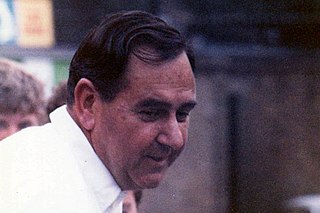
Michael Colin Cowdrey, Baron Cowdrey of Tonbridge, was an English cricketer who played for Kent County Cricket Club from 1950 to 1976, and in 114 Test matches for England from 1954 to 1975. He was born in Ootacamund, Madras Presidency, British India and died in Littlehampton, West Sussex.
Michael John Knight Smith, better known as M. J. K. Smith or Mike Smith, is an English double international, in cricket and in rugby union.
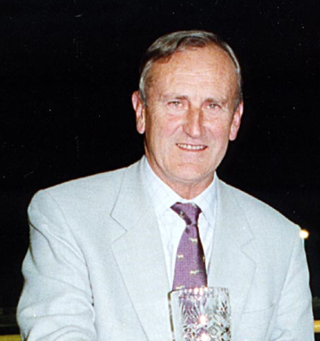
Edward Ralph Dexter, was an England international cricketer.
Trevor Martin Chappell is a former Australian cricketer, a member of the South Australian Chappell family which excelled at cricket. He played 3 tests and 20 One Day Internationals for Australia. He won the Sheffield Shield with New South Wales twice, and scored a century for Australia against India in the 1983 World Cup. His career was overshadowed, however, by an incident in 1981 in which he bowled an underarm delivery to New Zealand cricketer Brian McKechnie to prevent the batsman from hitting a six.
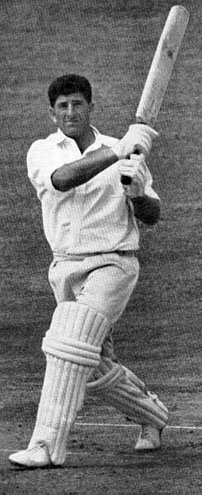
Kenneth Frank Barrington, was an English international cricketer who played for the England cricket team and Surrey County Cricket Club in the 1950s and 1960s. He was a right-handed batsman and occasional leg-spin bowler, known for his jovial good humour and long, defensive innings "batting with bulldog determination and awesome concentration".

Robert Walter Vivian Robins was an English cricketer and cricket administrator, who played for Cambridge University, Middlesex, and England. A right-handed batsman and right-arm leg-break and googly bowler, he was known for his attacking style of play. He captained both his county and his country; after the Second World War, he served several terms as a Test selector.
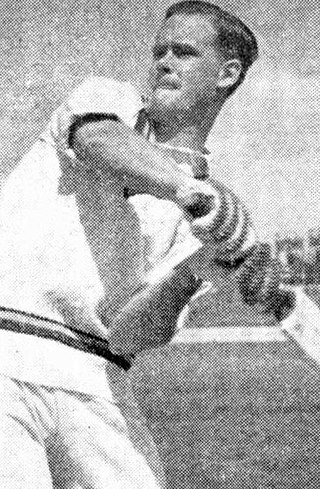
Dennis Brian Close, was an English first-class cricketer. He was picked to play against New Zealand in July 1949, when he was 18 years old. Close went on to play 22 Test matches for England, captaining them seven times to six wins and one drawn test. Close also captained Yorkshire to four county championship titles – the main domestic trophy in English cricket. He later went on to captain Somerset, where he is widely credited with developing the county into a hard-playing team, and helping to mould Viv Richards and Ian Botham into the successful players they became.
International cricket in South Africa between 1971 and 1981 consisted of four private tours arranged by English sports promoter Derrick Robins, two tours by a private team called the "International Wanderers", and one women's Test match. The apartheid policy followed by the South African Governments of the day meant that no Test match playing nation was willing to tour, thereby depriving world cricket of leading stars such as Graeme Pollock, Barry Richards, Clive Rice and Eddie Barlow.
Sir Wesley Winfield Hall is a Barbadian former cricketer and politician. A tall, strong and powerfully built man, Hall was a genuine fast bowler and despite his very long run up, he was renowned for his ability to bowl long spells. Hall played 48 Test matches for the West Indies from 1958 to 1969. Hall's opening bowling partnership with fellow Barbadian Charlie Griffith was a feature of the strong West Indies teams throughout the 1960s. Hall was one of the most popular cricketers of his day and was especially popular in Australia, where he played two seasons in the Sheffield Shield with Queensland.
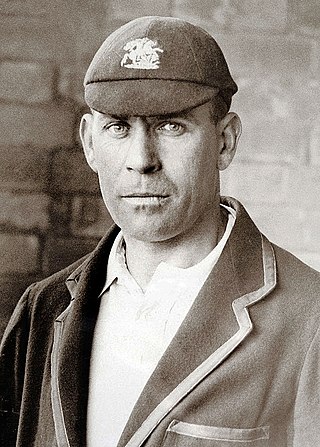
Elias Henry "Patsy" Hendren was an English first-class cricketer, active 1907 to 1937, who played for Middlesex and England. He also had a concurrent career as a footballer and had a long tenure with Brentford F.C. He was born in Turnham Green and died in Tooting Bec. A right-handed batsman who occasionally bowled off breaks, Hendren was one of the most prolific batsmen of the inter-war period, averaging 47.63 in his 51 Test matches and 50.80 in all his first-class matches. He has the third highest first-class run aggregate of 57,611 runs, and his total of 170 centuries ranks second only to Hobbs, who was a personal friend. Hendren was a noted wit, a keen practical joker and had a talent for mimicry.

Farokh Maneksha Engineer is an Indian former cricketer. He was a wicket-keeper-batsman, usually an opening batsman, who represented India in 46 Test matches from 1961 to 1975. In first-class cricket, he played for Bombay from 1959/60 to 1974/75, for West Zone from 1961/62 to 1974/75, and for Lancashire County Cricket Club from 1968 to 1976. He was the first-choice wicket-keeper for the Rest of the World team which toured England in 1970 and Australia in 1971–72.
Graham Douglas McKenzie – commonly known as "Garth", after the comic strip hero – is an Australian cricketer who played for Western Australia (1960–74), Leicestershire (1969–75), Transvaal (1979–80) and Australia (1961–71) and was a Wisden Cricketer of the Year in 1965. He succeeded Alan Davidson as Australia's premier fast bowler and was in turn succeeded by Dennis Lillee, playing with both at either end of his career. McKenzie was particularly noted for his muscular physique and ability to take wickets on good batting tracks. His father Eric McKenzie and uncle Douglas McKenzie played cricket for Western Australia. Garth was chosen for the Ashes tour of England in 1961 aged only 20. He made his debut in the Second Test at Lord's, where his 5/37 wrapped up the England innings to give Australia a 5-wicket victory.
Simon Peter Hughes, also known as The Analyst, is an English cricketer and journalist.
M.J.K. Smith captained the English cricket team in Australia in 1965–66, playing as England in the 1965–66 Ashes series against the Australians and as the MCC in their other matches on the tour. The 5-Tests series ended in 1–1 draw. Although they failed to reclaim the Ashes this was not unexpected as the Australian press labelled them the weakest MCC team to arrive in Australia and the bookmakers were giving odds of 7/2 on their winning the series. These views rapidly changed as they set about winning their state matches with exciting, aggressive cricket and by the First Test the odds against them had been reduced to evens. Lindsay Hassett said "other teams from England may have been better technically but none had tried so hard to make the game as interesting as possible". Financially the tour's receipts were much lower than in 1962–63 due to the number of rain-affected games in a wet Australian summer and the general doldrums of the sixties.
The history of United States cricket begins in the 18th century. The first game was between the US and Canada and held in 1844 in front of an audience of 5,000 spectators in New York. Among early Americans, cricket was as popular a bat and ball game as baseball. Though Americans never played cricket in great numbers, the game grew for some time. Around the time of the United States Civil War, the game began competing with baseball for participants, but then slowly declined in popularity. This was followed again by a brief golden age with the Philadelphian cricket team. This lasted until roughly the start of World War I; at this time, cricket again became less popular. In the latter part of the 20th century immigrants from cricket-playing nations in South Asia and the West Indies helped spark a resurgence in the game's popularity. This led to participation and success in several International Cricket Council events. In 2007, the United States of America Cricket Association was suspended by the ICC because of problems with its administration, but was again recognized beginning in 2008.
International cricket teams raised by Marylebone Cricket Club (MCC) have visited Sri Lanka, formerly Ceylon, on 23 occasions from 1911-12 until the most recent tour in the winter of 2000-01. Eleven of the teams were England national cricket teams raised by MCC during the period when it held responsibility for Test cricket played by England. The other twelve were MCC teams per se which did not take part in Test cricket.
This article describes the history of cricket in Pakistan from 1947 to 1970.
Every player to appear in Kerry Packer's World Series Cricket is listed below along with their appearance records.
Four teams would take part in the various World Series Cricket competitions, Australia XI, Cavaliers XI, West Indies XI, World XI.

The World Series Cricket West Indies XI was a cricket team representing West Indies in World Series Cricket (WSC). Their first game was against the Australia XI in 1977. World Series Cricket ended in 1979 after the Australian XI tour to the West Indies. The side was composed of current West Indian international cricketers, except for Jim Allen, the only squad member not to play Test cricket. During WSC many of the West Indian squad also played against the official Australian touring side, that did not feature WSC cricketers. Against in effect a second string Australia West Indies won the first two tests convincingly. Only Alvin Kallicharran and Derick Parry played who were not signed to WSC. However, when the WSC cricketers were unavailable from the third test, the contests were more even. Australia won the third test, West Indies the fourth, while the fifth was drawn.
The 2012 English cricket season was the 113th in which the County Championship had been an official competition. It began on 31 March with a round of university matches, and continued until the final of the Clydesdale Bank 40 on 15 September. Three major domestic competitions were contested: the 2012 County Championship won by Warwickshire, the 2012 Clydesdale Bank 40 and the 2012 Friends Life t20 both won by Hampshire Royals.